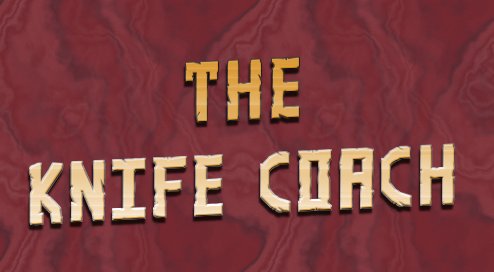Welcome to Knife Coach #6 / In This Session: Keeping Your Knives Spotless and Sharp
The world has grown up and now many, many people have knowledge of the knife. We must remember that a knife is to be respected in the hands of a novice or in the hands of a professional. The knife has the spirit of fire about it, no matter the size of the knife the spirit is always fierce. Respect must go to a deeper level of understanding for a professional disciple of the knife. And that my friends is what this piece is all about.
The way of the knife most certainly has it's so called "do's and do not's". To know of these "customs" is to come off smelling like rose in person to person blade interactions of any type. To be unaware of these elements that underlie the world of cutlery collectors, knife fighters and knife makers can make you come off as less than professional in their eyes. As your coach it's my duty to watch out for you not only tactically, but also socially.
Knife fighting skills are important, but so are your skills that maintain that knife - all levels of your knowledge and skill(s) are valuable. But good etiquette in knife circles is used more often than fighting skills, it's a fact. Etiquette involves safety, common sense, innate understanding, respect and yes, honor too. Let's dig deeper into this often overlooked aspect of the knife and we can examine a couple of examples for reference. Making you a better knife professional and refining of your knife manners is the goal.
One must learn that certain aspects of being a "knife guy" are not about someone's opinion or theories. Such banter about living the life of the knife is the fast food of forum fans and their lost in space kin. A classic example of the blind leading the blind and thus creating their own reality based upon inaccuracies and non-truths due to their own self "limitations".
The type of understanding I refer to goes beyond personal opinion of "this and that" because it is based upon common sense, awareness and safety. Things which all reasonable people can agree upon, practice and understand. In saying all of that I now must speak with you regarding simple knife hygiene. That's right, keeping your knives spotless and clean is a part of responsible weapon or tool ownership.
Never touch the blade of a knife, your own or that of others. your fingers contain corrosive oils and can damage a blade. CLEAN is a major component of firearms ownership that has taught been taught since firearms were invented. The old saying goes thus: "The sun must never set upon a dirty gun" (of course this was back in the day of corrosive powders). But the ritual habit of keeping your gun clean, ready and in tip top shape gives you confidence when you need it. Suffice to say that such maintenance is respected and advised by the wise.
I encourage you knife men to adopt the same ideals as those of the gunmen
but apply the concepts to your knife (knives).
Malfunctions with cutlery come in a variety of forms. There are those like failure to fully open or the lock is unable to engage and a failure to cut as intended (a dull knife is like a dud round in a pistol). There are more malfunctions depending upon what type of knife you might carrying.
Many of these problems can be solved and prevented via regular inspection and cleaning. Failure to lock the blade open (folders) is often due to pocket lint. I've seen a teeny piece of pocket fuzz totally screw up an expensive folder. If the knife is somehow abused, smashed, thrown, etc. it can effect the quick opening (deployment) of your knife if it is a folding type. If you really must count on that knife you better treat it well. A dull knife is truly BAD! Dull knives fail, they can snag, they can even make simple work dangerous.
A dull knife is just a stubby little metal club when it cannot perform it's duties as a cutting and piercing device. Success or failure can often be traced back to good maintenance or the lack of it. Such minor things can and will influence the outcome of any encounter that comes upon you. No matter whether you are using your knife for utility reasons (field work, DIY projects), defense purposes (tactical use, backup weapon) or part of a sporting event requirement (yachting, fishing, hunting).
Keeping it clean makes a better machine, your car, your cycle, your gun or your knife will thank you. Next we must address one of the foremost important reasons for keeping that blade of yours super, surgically clean and sharp! Ok, this is easy. ALWAYS keep your knife/tool scrubbed clean!
Pick a knife design that cleans easily (some do, some don't clean up well) anything illegal then will scrubbed off real well with some hot soapy water. If you have blood of any kind on your knife you may wish to use a bleach solution to truly cleanse the unit of any pathogens or diseases.
Look closely for fibers, hairs, gunk or edge accumulations. Police will often confiscate a knife (might be a traffic stop) and then (on the spot) spray it down for any suspicious evidence(s). Might this chemical search turn up residue of pot, coke, hashish, blood (human) or any other variety of interesting "evidence" (including your own DNA) you might be entering that notorious "bubble of trouble" due to your own bad cutlery hygiene practices.
Folders are particularly bad about collecting debris and keeping it hidden away until it causes an arrest or failure. Folders are "evidence lockers" plain and simple. In knowing this some extra detail must be given on folding knives that fixed blade knives may not require. Although something as simple and cool looking as file work (jimping) on the spine of your hunting knife can also work to keep evidence just as the interior of a folder can. Cracks, grooves and crevices are not your friend Mr. knife guy! Wash that knife, dry that knife. Use a dental pick and get in them cracks too. If your main carry knife becomes to heavily contaminated then by all means replace it with something newer and cleaner.
In some regards keeping your knife clean shows respect for what it represents. A clean knife also shows self respect and proper training (or upbringing). If you understand that some cultures believe that certain blades (knives) can contain an entity (spirit) then it is all the more reason to show reverence in such matters.
Knives do seem to have an energy about them. Many cultures recognize this aspect. The path of the knife is not just cutting, stabbing, hunting, collecting and martial arts. There is an invisible underlying element of courtesy and respect that goes with all of it.
Ok, thank you for reading! I'm the Knife Coach and it's been great talking with you today.
Stay sharp and go clean up that EDC (every day carry) knife of yours!
And please check out the accompanying Youtube video of this article HERE -
Thanx for reading and allowing me into your training hall.
I'm the Knife Coach and I hope to be seeing you again soon!
~ An Unbroken Line of Skilled Knifemen from the Dawn of Time to the Present ~
TM

